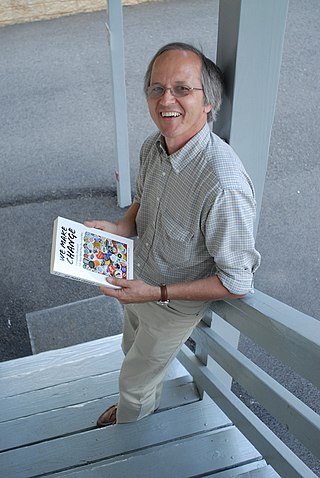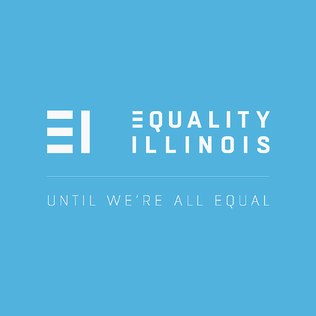
Community organizing is a process where people who live in proximity to each other or share some common problem come together into an organization that acts in their shared self-interest.
Democracy Matters is an American non-profit, non-partisan grassroots student political organization that is dedicated to deepening democracy. The organization's mission is to strengthen democracy by: (1) training young people how to be effective grassroots organizers and advocates; and (2) supporting public financing of election campaigns and other pro-democracy and campaign finance related reforms. Democracy Matters believes that it is imperative to reduce the overwhelming influence of big private and corporate money in elections and necessary to empower ordinary people—regardless of race, gender, and/or socio-economic status—to be able to participate meaningfully in the electoral and political process. Democracy Matters is also a part of the Declaration for American Democracy coalition.

The Consumer Federation of America (CFA) is a non-profit organization founded in 1968 to advance consumer interests through research, education and advocacy.
The Comprehensive Permit Act is a Massachusetts law which allows developers of affordable housing to override certain aspects of municipal zoning bylaws and other requirements. It consists of Massachusetts General Laws (M.G.L.) Chapter 40B, Sections 20 through 23, along with associated regulations issued and administered by the Massachusetts Department of Housing and Community Development. Chapter 40B was enacted in 1969 to address the shortage of affordable housing statewide by reducing barriers created by local municipal building permit approval processes, local zoning, and other restrictions. Its goal is to encourage the production of affordable housing in all communities throughout the Commonwealth.

The Advancement Project is a politically liberal American nonprofit organization that focuses on racial justice issues. The organization has a national office in Washington, D.C., as well as a California-specific office based in Los Angeles.

Kimberly Ann Bobo is an American religious and workers' rights activist, and current executive director of the Virginia Interfaith Center for Public Policy (VICPP), a non-partisan advocacy coalition based in Richmond, Virginia. Bobo is a nationally known promoter of social justice who leads VICPP's advocacy, outreach, and development work. She wrote a book on faith-based organizing entitled Lives Matter: A Handbook for Christian Organizing.

Joe Szakos is a community organizer and author. He was coordinator of Kentuckians for the Commonwealth (KFTC) from 1981 to 1993, and was the executive director of Virginia Organizing from 1994 to 2017. After stepping down from the directorship, he became the Lynchburg Chapter organizer until his retirement in November 2020.

Elections in Virginia are authorized under Article I of the Virginia State Constitution, sections 5–6, and Article V which establishes elections for the state-level officers, cabinet, and legislature. Article VII section 4 establishes the election of county-level officers. Elections are regulated under state statute 24.2-102. The Virginia State Board of Elections oversees the execution of elections under state law. In a 2020 study, Virginia was ranked as the 12th easiest state for citizens to vote in.

Samuel Chu Muk Man is a Hong Kong-born American activist and community organizer. Chu is the founder and President of The Campaign for Hong Kong, a US-based nonpartisan organization whose mission is to advocate for American leadership and policies that advance human rights and democracy in Hong Kong. He is also a founding member of the advisory board of the Axel Springer SE Freedom Foundation in Berlin (Germany), a senior advisor to the president and CEO of MAZON: A Jewish Response to Hunger, and a trainer for Midwest Academy, a training school for community organizers in the US.

Jewish Council on Urban Affairs (JCUA) is a nonprofit organization based in Chicago that mobilizes the Jewish community of the region to advance racial and economic justice. JCUA partners with diverse community groups across the city and state to combat racism, antisemitism, poverty and other forms of systemic oppression, through grassroots community organizing, youth education programs, and community development.
The Boston Workers Alliance of Boston, Massachusetts, is a "community organization led by unemployed and underemployed workers fighting for employment rights." Based in Boston's low-income neighborhood of Grove Hall, Roxbury, it acts as an unemployed-workers' union, providing direct services, incubating new businesses and leading organizing campaigns led by its membership.
Social Policy is a quarterly magazine focused on labor and community organizing around the world. Its contributors are a mixture of academics, activists, leaders, and organizers.
Action civics is a modern and alternative form of civics education in the United States. Action civics is an applied civic education process in which participants learn about government by examining issues in their own community and then select a focus issue for action through a process of debate, research the issue and learn advocacy strategies, develop civic skills such as public speaking, formulate a plan, mobilize, educate, then evaluate, and reflect on their experience. Participants' voices are encouraged, valued and incorporated. Participants learn by doing, with a focus on collective action. Action civics can encompass a number of different actions from community service to electoral engagement and from talking about concerns with public officials to creating peer education campaigns.

Equality Illinois (EI) was founded in 1991 to work towards building a better Illinois by advancing equal treatment and social justice through education, advocacy, and protection of the rights of the LGBT community.

The Ohio Organizing Collaborative (OOC) is a 501(c)(3) non-profit statewide organization focused on uniting community organizers and organizing groups across Ohio with similar interests. The OOC was formed in 2007 by Kirk Noden with a mission of organizing citizens to build power and combat social, racial and economic injustices in communities across Ohio. The goal for the OOC is to organize Ohioans and the Midwest citizens into a progressive movement. The OOC is composed of 18 community-based organizations with members in every major city across Ohio. These organizations include labor unions, faith organizations, community organizing groups among others. Currently the OOC participates in eight campaigns across the state through direct advocacy, voter engagement, fundraising, and community growth. Funding for the OOC is provided in many different ways including third party investors, grants, and fundraising.

Kelly Teal Thomasson Mercer is an American Democratic politician, who served as the Secretary of the Commonwealth of Virginia from April 2016 to January 2022. Initially appointed by Governor Terry McAuliffe, she continued as Secretary under the administration of Governor Ralph Northam. Prior to her appointment as Secretary, Thomasson served as Deputy Secretary of the Commonwealth under Governor McAuliffe.
Unite America is an American grassroots organization founded by Charlie Wheelan with the goal of reforming the political system and bridging the partisan divide. Unite America supports both electoral political reforms as well as independent-minded candidates.
The Hispanic Federation (HF) is a U.S based non-governmental organization focused on supporting Hispanic communities through local, state, and national advocacy. The Federation was founded in New York City in 1990 by a small group of Latino leaders, establishing initiatives to advocate for the interests of the Hispanic community and has expanded to establish programs, and policies in 16 states. The organization's objective is to empower and advance the Hispanic community primarily through service pillars, membership services, advocacy, and community programs. The Federation has formed relationships with a network of 100 Latino grassroots nonprofits, as well as collaborating with organizations, government officials, and private sector partners to enact systemic change related to a variety of socioeconomic issues for Hispanic communities. The Federation has gained national recognition for its work in areas of education, health, immigration, economic empowerment, civic engagement, environment, and organizational development to strengthening Latino institutions to ultimately increase the quality of life within Hispanic communities.

Desmond Meade is a voting rights activist and Executive Director of the Florida Rights Restoration Coalition. As chair of Floridians for a Fair Democracy, Meade led the successful effort to pass Florida Amendment 4, a 2018 state initiative that restored voting rights to over 1.4 million Floridians with previous felony convictions. In April 2019, Time magazine named Meade as one of the 100 most influential people in the world. Meade's autobiography Let My People Vote: My Battle to Restore the Civil Rights of Returning Citizens was published in 2020; in 2021 he was awarded a MacArthur "Genius Grant."

Richmond, Virginia, held a general election on November 3, 2020. Voters elected the Mayor of Richmond, Virginia, members of the Richmond City Council, as well as several other local officials. The incumbent, Levar Stoney, who was elected in 2016 ran for reelection facing five challengers. While local races in Virginia are officially nonpartisan elections, four candidates identified with the Democratic party while Griffin ran as an independent. Stoney won the most votes in six out of nine city council districts and therefore won reelection. In order to win election a candidate must receive the most votes in five or more districts.














